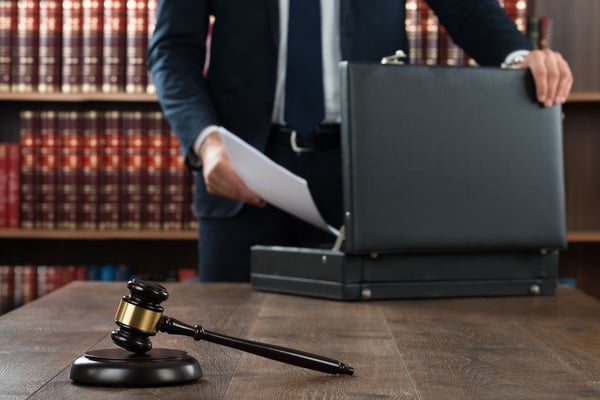
Juries are not just for criminal cases. In most civil disputes, the parties have the choice of having the trial in front of a judge only, or in front of a judge and jury. In cases where the trial is done without a jury, it is easy to understand that the judge will take on whatever role the jury would have played. But, what is the role of the jury in a civil dispute?
Law vs. Facts
In a lawsuit, all the possible disputes in the case can be divided into a dispute over “the law” or a dispute about “the facts.” Understanding that division becomes key in understanding what role the jury plays in a trial. That distinction, however, is not always clear since there is almost always a dispute over the facts, and those facts determine how the law is applied.
A dispute over the law is probably best illustrated in a case where the parties agree on exactly what happened, but each side cannot agree on how the law applies to the particular case. For example, four cars approach an intersection from all different directions. No one had a stop sign, and they all collide in the intersection. All drivers agree on exactly what happened, and there is no question that they all arrived at exactly the same time. However, the parties disagree on who had the right of way. Such a question would likely be a “matter of law.” A judge would decide how the law should be interpreted to determine who had the right of way in such a situation.
On the other hand, a dispute over the facts can be illustrated in a case where the law is clear, but each party claims something different happened. For example, it is clear that if someone runs a red light and strikes a car that had a green light, the person who ran the red would be at fault. If each party claims that they had a green light and the other person had a red light, that is a dispute over the facts.
Judge - Questions of Law
The average juror has not gone to law school, does not have experience researching statutes or case law, and does not have experience or training in understanding the nuances of what individual words in a statute may mean. Consequently, “questions of law” are left up to the judge to determine.
If there is no dispute over what happened, a party can file a motion and request that the judge decide the case before it ever gets to trial based solely on the judge’s interpretation of the law. During the trial, the judge will make rulings on objections and determine what evidence can be admitted in the case. However, the judge does not decide what happened. That is a question of fact, and should be left to the jury.
Jury – Questions of Fact
I have heard it said that there are often three parts to the story: (1) what the plaintiff thinks happened, (2) what the defendant thinks happened, and (3) the “truth” somewhere in the middle. The jury’s sole purpose is to decide what actually happened or what the truth is. The jury listens to all the evidence, all the witnesses, and the arguments made by the lawyers, and then they have the unenviable task of deciding what really happened.
In all cases that go to trial, there will be witnesses on each side who say something different than the other side. If that was not the case and each side agreed on what happened, then the case would never get to trial. The jury must figure out who is telling the truth or who is more believable. The jury can take into account how believable each witness seems and try to figure out if a witness is telling the truth or if they are mistaken. The jury pieces the “true” story together from the bits and pieces that are provided throughout the trial.
Mixing Law and Facts
Due to the interplay between the law and the facts, people often mistakenly believe that a jury is being asked to determine the law as well. However, that is not really the case. The jury is not being asked to decide what the law says. They are being asked to decide what happened in this individual case, so that the correct law can be applied to determine the outcome and who is liable.
At the end of a trial, the judge will provide a series of instructions for the jury. Those instructions will include a mini-lesson for the jury about what the applicable law says and what various legal terms means. The jury is then often presented with a choice—for example: if you find that the defendant did “X” then you must find the defendant liable; if you find that the defendant did “Y” then you must find that the defendant is not liable.
The jury is still deciding what factually happened in the case (in my example: did the defendant do “X” or did he do “Y”). Then, those facts are plugged into the law as determined by the judge (in my example: “… then you must find…”).
It is through that interplay that we can ask twelve average citizens, without any legal experience or training, to be involved in the decision making of a complicated case worth millions of dollars and still have confidence that the law (and not the mistaken understanding of a few jurors) is followed.
If you have questions about trial law or the jury's role in civil litigation, call the trial attorneys at Goosmann Law Firm in our Omaha, Sioux City, or Sioux Falls offices.






Let Us Know What You Thought about this Post.
Put your Comment Below.